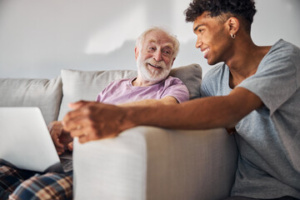 What do you do when you are responsible for the care of your elderly or disabled loved one, but you are not able to get them adequate healthcare, get their bills paid, or recertify their public benefits?
What do you do when you are responsible for the care of your elderly or disabled loved one, but you are not able to get them adequate healthcare, get their bills paid, or recertify their public benefits?
What do you do when you are struggling to balance caring for your loved one, working, and taking care of your own needs?
Unfortunately, this is a reality for too many across the U.S.
In New York City alone, up to 1.3 million individuals are providing unpaid care for their loved ones, including elderly parents and adult children with intellectual disabilities.
At LegalHealth, a division of New York Legal Assistance Group, we have provided legal support within hospitals to people experiencing poverty, people with terminal illness, immigrants, and other vulnerable populations across New York City for over 21 years. Regularly, caregivers come into our legal clinics hoping to accomplish the most basic and necessary tasks for their aging or intellectually disabled loved ones, such as requesting repairs in their apartments and straightening out social security issues. They encounter roadblock after roadblock because they do not have the legal authority to act on their loved one’s behalf. These barriers not only keep their loved ones from living healthily and independently in their own homes but put undue stress on the caregiver as well.
It is well documented that the burden of caregiving takes an enormous physical, emotional, and financial toll. Most family caregivers who care for household members with intellectual disabilities are over the age of 50, and over two-in-five provide 40 hours of care each week. Many family caregivers do paid labor in addition to their informal caregiving role. The demands of their caretaking leave many struggling to stay employed and barely able to get by. This was exacerbated by the COVID-19 pandemic, which increased fears about placing loved ones in institutional or group settings.
Thankfully, New York City is home to a number of community-based caregiver support organizations that provide family caregivers and adults with disabilities support and access to resources. What is lacking until now is a legal provider fully dedicated to providing legal advocacy in all areas of the law impacting a family caregiver and their loved ones who receive care.
With the support of two foundations and a local legislator, LegalHealth created a pilot to address this unmet need. It is called Project Assist, and our goal is to better equip caregivers so that they can assist their loved ones and alleviate the barriers and stress that come with being responsible for the family members in their charge.
We are working to establish legal clinics at community-based caregiver support facilities throughout New York City, with the long-term goal of opening a city-wide intake telephone line. We are also developing trainings for professional staff at caregiver support facilities, educating them about the legal mechanisms and benefits options that will allow them to better support their loved ones.
We are having conversations with caregivers and care receivers about the importance of planning ahead and completing advance planning documents so that households have a plan and designated agents for when care receivers either lose capacity or lose the physical ability to accomplish their own needs. Additionally, we are taking on guardianship cases where other advance directives are not an option, allowing us to serve caregivers of people with intellectual disabilities as well as caregivers of the sick and aging.
LegalHealth already has the expertise of working with patients in hospital settings, and we are well-versed in all the areas of law that impact caregivers and care receivers, such as housing, immigration, social security, public benefits, and other issues. So, while Project Assist primarily aims to empower caregivers with the legal mechanisms to provide care, namely, advance directives and guardianship, we also give caregivers a comprehensive consultation on the legal avenues and care benefits available to them and their loved ones, and are able to alleviate confusion, point people in the right direction, and take on additional legal issues impacting them.
Crystal Hudson, a member of the New York City Council, is a fierce supporter of Project Assist. Herself a former caregiver, she learned first-hand the difficulties caregivers face after she began caring for her mother once she was diagnosed with Alzheimer’s disease. Her experience drove her to run for office and ensure that all caregivers are aware of and have access to the resources they need.
Earlier this year, Council Member Hudson told Brooklyn Magazine, “What really propelled me into public service was caring for my mom, was serving as a caregiver, and seeing firsthand how incredibly difficult it was to get access to services, to resources, basic information even at times. Navigating bureaucracy, the healthcare system, trying to figure out what you qualify for, and so often when the case is you’re being told what you don’t qualify for. I wanted to make a difference. I wanted to make sure that other families wouldn’t have to go through what my family had to go through. And so I figured if I entered into local politics, I might actually have a real opportunity to effect change at a very grassroots, local, personal level.”
While Project Assist is based in New York, our hope is that it serves as an inspiration for medical-legal partnerships throughout the country to look within their own communities for caregiver support groups, sympathetic legislators, and funders to connect with to ease the burden of family caregivers. It is very likely that each of us may take on a caregiver position one day, so the more we can support caregivers, the better we can equip ourselves, our families, and our communities.
—-
To learn more about LegalHealth, visit https://legalhealth.org/.
